| Article ID | Journal | Published Year | Pages | File Type |
|---|---|---|---|---|
| 10317467 | Research in Developmental Disabilities | 2014 | 6 Pages |
Abstract
Children with hearing impairment have balance and motor deficits primarily due to concomitant damage to the vestibular structures. Although early intervention focused on the development of communication skills, investigations of intervention for the amelioration of balance deficits in children with hearing loss have been minimal and inconclusive. Therefore, using an experimental design, the present study investigated the effect of a 12-session exercise balance program based on proprioception training on balance and gait in deaf as compared with hearing schoolchildren. The subjects, 10 deaf and 10 typically developing children were assigned to an experimental and a control group respectively. Taking up the initial differences between the groups through a pretest under different conditions, the participants in the experimental group went through a 12-session intervention program including static and dynamic training with emphasis on proprioceptive system. After this, the participants were tested again. The data obtained was analyzed using repeated measure. A comparison between the control and experimental groups revealed that the intervention program had not significantly increased gait velocity while it had significantly decreased the amount of sway. Thus, it was concluded that an exercise program that enhances somatosensory ability can result in improved balance in deaf children.
Related Topics
Life Sciences
Neuroscience
Behavioral Neuroscience
Authors
Mahdi Majlesi, Nader Farahpour, Elaheh Azadian, Mahdi Amini,
